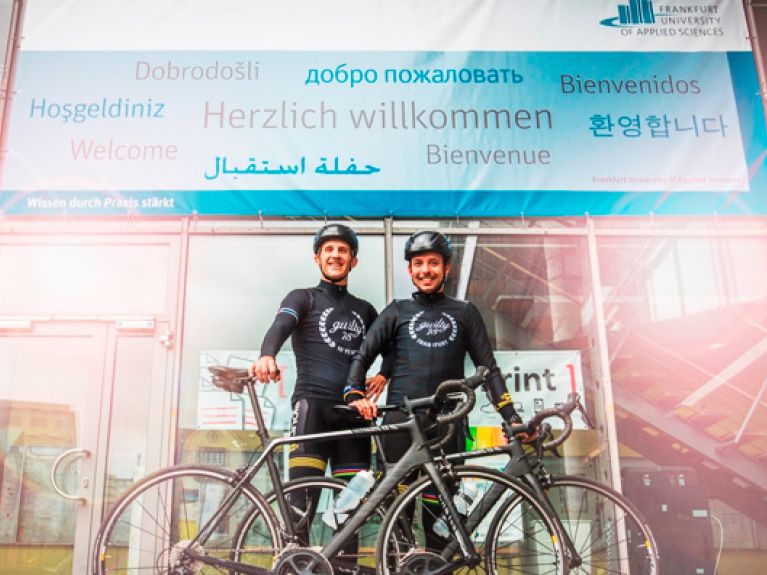EU ambassadors on racing bikes
Thomas John and Johannes Rosenberger travelled 4,700 kilometres across the EU on four weekends – to promote a Europe without borders. On the way they were able to inspire lots of people to support their idea.

Thomas John and Johannes Rosenberger from Frankfurt am Main spent a summer in Europe winning people over. First of all, the two young men had set themselves a sporting goal: starting from Frankfurt on four weekends, they wanted to explore the continent of Europe on their racing bikes as part of their EU Ride project.
Although the former triathletes, both in their late twenties, had not planned to collect other riders on the way, they were very welcome to tag along. After all, their EU Ride was not only meant to be a great feat of endurance, but above all to promote the European ideal: in favour of a community of nations without borders where “passes” are only compulsory for cyclists crossing the Alps. “We want to symbolise the unity of Europe through sports. Starting in Frankfurt, you can discover all directions of Europe in one weekend,” write the two extreme sportsmen on their website. Europe is a unique place, they explain, one of great diversity, but also of great distinction, both together in one geographical space. “Europe is not only the name of a continent but also of a unified territory without borders.”
John and Rosenberger found Simon, one of their temporary companions on their way to Warsaw. The German was so inspired by the duo’s idea that he bought himself an old racing bike to escort the EU Riders on their last weekend trip at the end of September 2016: Simon visited his uncle, who lives near their route to Italy, and then kept going all the way to the final destination of Rome.
The EU Ride’s peleton of volunteers usually encompassed some ten riders from all over Europe. The retinue also included five helpers who travelled in two minibuses. In all, the group covered 4,700 kilometres over four weekends. The first excursion, which headed west, ended earlier than anticipated. The cyclists did not make it to Normandy as planned, but stopped in Paris because Rosenberger had problems with his Achilles tendon. Afterwards, however, everything went to plan: the rolling EU ambassadors reached Göteborg, later Warsaw and finally Rome.
Almost everywhere their campaign for Europe was well received, report John and Rosenberger. In Italy a local guided the group to the best ice-cream parlour in town, and in Sweden the escort grew to 20 cyclists which gave the two leaders a little protection from strong blustery winds and enabled them to collect new strength. There was no trace of Europhobia in Warsaw either.
The greatest threats to the pedalling heroes came from reckless car drivers. In Italy John and Rosenberger often found that traffic regulations tend to be interpreted as recommendations rather than rules. They also discovered, however, that the sounding of a horn was not necessarily meant in a negative way.
The Euro cyclists did not only get to know different countries and people during the four expeditions, but also gained useful “project management skills”, as Rosenberger puts it. Just planning the route with the aid of GPS technology required a certain amount of logistical common sense if the journey was not to end in a field in the middle of nowhere. Adept people management, on the other hand, was required to keep the riders together, as John reports: “There are always situations when one person feels like superman and the other like an earthworm.”
Some of the experiences John and Rosenberger had during the EU Ride will probably also help them in their professional lives. John works for a technology startup that develops training analysis equipment for footballers. Rosenberger is currently studying for his master’s in engineering at Frankfurt University of Applied Sciences. The university combined the racing cyclists’ start for Paris in June with the opening festivities for its Center for Applied European Studies.
Their four-stage voyage of European discovery will not be the two cyclists’ last sporting feat. John and Rosenberger, who have also both completed the Trans-Siberian Extreme cycle race, would like to go on a tour together. Preferably at weekends, which would fit in easiest with their work. And where could they go? John already has an idea: preferably neighbouring France.

